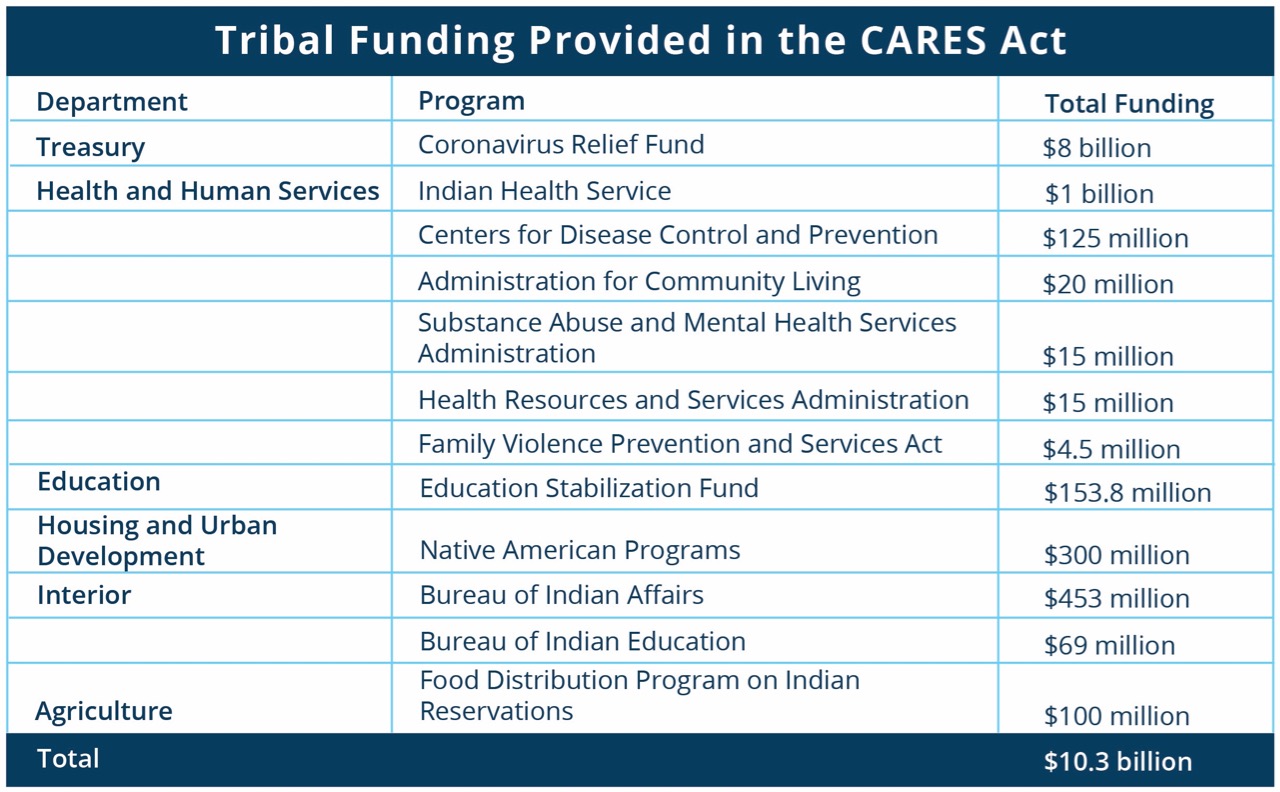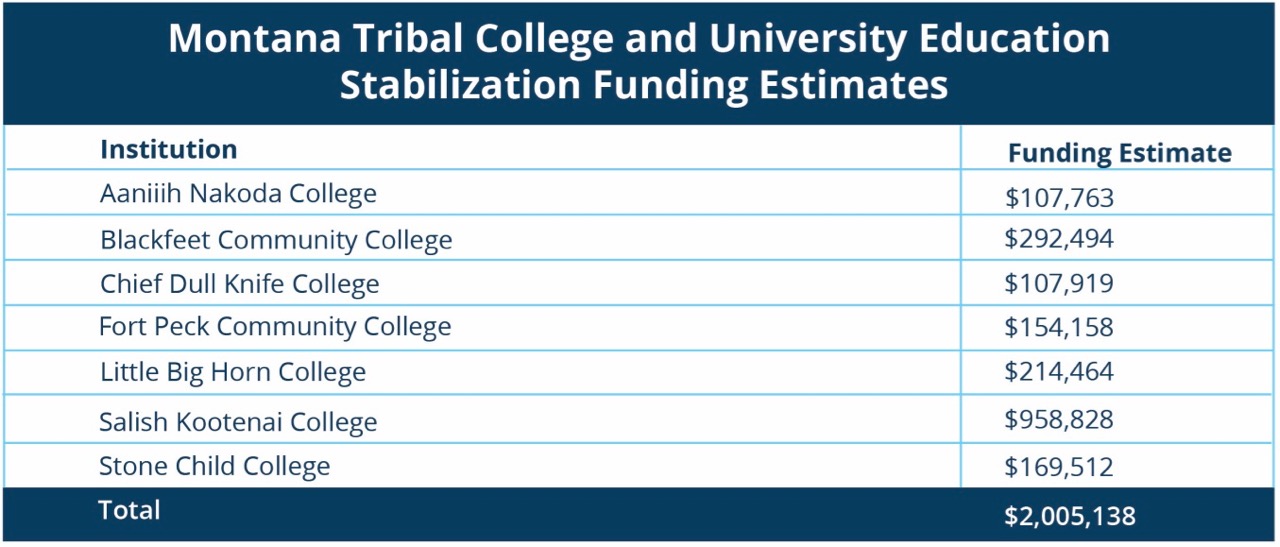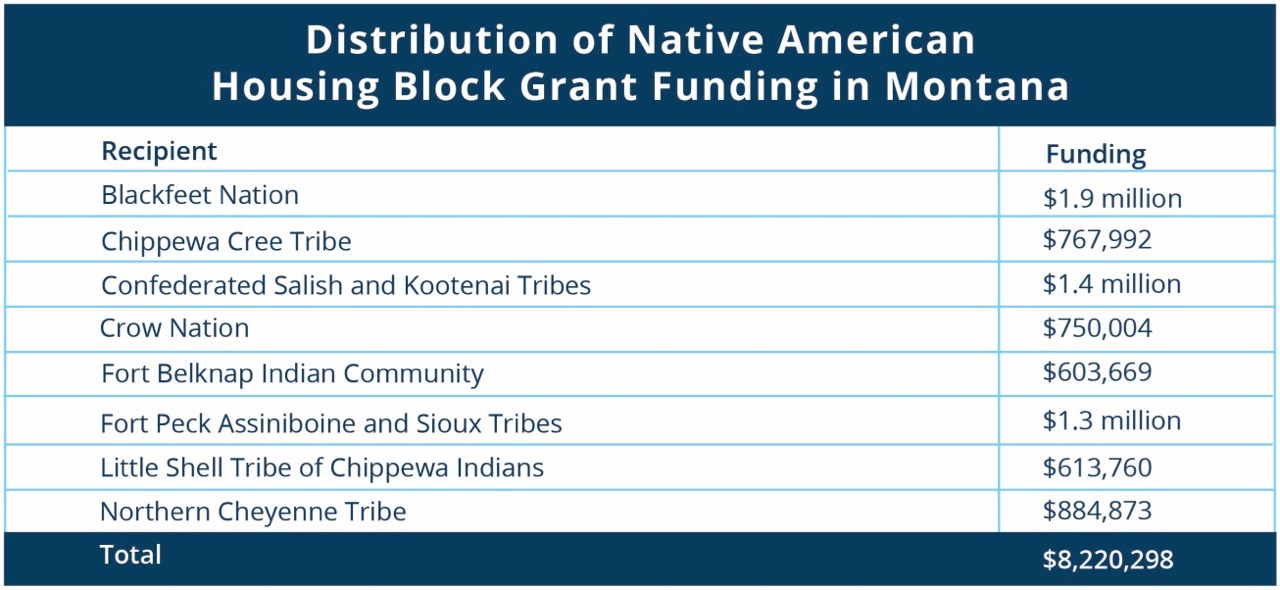On Friday, March 27, Congress passed the Coronavirus Aid, Relief, and Economic Security (CARES) Act, a $2 trillion emergency relief bill to help buffer the economic downfall of the coronavirus pandemic. The bill is the largest economic rescue package in U.S. history.[1]
The provisions of the 335-page bill are wide-ranging. Tribal-specific funding summarized in this report accounts for just more than $10 billion of the overall $2 trillion package.[2] Federal provisions of health care, education, housing, and economic development, for example, stem from the federal trust responsibility established in treaties. This responsibility includes the federal government’s legal obligation to provide assistance. The federal government has never adequately funded treaty provisions.[3]

Treasury
Program: Coronavirus Relief Fund
Appropriation: $8 billion
For fiscal year 2020, Congress has reserved $8 billion of Coronavirus Relief Funds for tribal governments for coronavirus-related spending. The Secretary of the Treasury will work in consultation with the Secretary of the Interior and tribal nations to determine the distribution of funding. Funds are to cover costs (i) that are necessary COVID-19 expenditures, (ii) for which a tribal government’s most recently approved budget did not account, and (iii) that a tribal government incurred for the period beginning on March 1, 2020 and ending on December 30, 2020.
Health and Human Services
Program: Indian Health Service
Appropriation: $1.032 billion
The CARES Act makes $1.032 billion available to the Indian Health Service (IHS) until September 30, 2021, for the purposes of preventing, preparing for, and responding to coronavirus. Recipients may use funds for public health support, electronic health record modernization, telehealth and other information technology upgrades, Purchased/Referred Care, Catastrophic Health Emergency Fund, urban Indian organizations, Tribal Epidemiology Centers, Community Health Representatives, and other activities to protect the safety of patients and staff. Of the total appropriation, the bill makes:
As of April 1, 2020, IHS is consulting with tribal leaders to determine the distribution of funds.
Program: Centers for Disease Control and Prevention
Appropriation: $125 million
Until September 30, 2024, the CARES Act makes $125 million available to tribal nations, tribal organizations, urban Indian health organizations, or health service providers to tribal nations for reasons that include, but are not limited to, carrying out surveillance, epidemiology, laboratory capacity, infection control, mitigation, communications, and other preparedness and response activities. As of March 31, 2020, the Centers for Disease Control and Prevention is consulting with tribal leaders to determine the distribution of funds.
Program: Administration for Community Living
Appropriation: $20 million
Until September 30, 2021, the CARES Act makes an additional $20 million available for nutrition services authorized under the Older Americans Act of 1965. The program serves elders.
Program: Substance Abuse and Mental Health Services Administration
Appropriation: $15 million
The CARES Act makes at least $15 million available to tribal nations, tribal organizations, urban Indian health organizations, or health or behavioral health service providers through September 30, 2021, to tribal nations for coronavirus-related health surveillance and program support. As of April 1, 2020, the Substance Abuse and Mental Health Services Administration is consulting with tribal leaders to determine the distribution of funds.
Program: Health Resources and Services Administration
Appropriation: $15 million
Until September 30, 2022, the CARES Act makes at least $15 million to tribal nations, tribal organizations, urban Indian health organizations, or health service providers to tribal nations to carry out telehealth and rural health activities. As of April 1, 2020, the Health Resources and Services Administration is consulting with tribal leaders to determine the distribution of funds.
Program: Family Violence Prevention and Services Act
Appropriation: $4.5 million
The CARES Act makes $4.5 million available for tribal domestic violence shelters through the Family Violence Prevention and Services Act through September 30, 2021.[4]
Education
Program: Education Stabilization Fund
Appropriation: $153.8 million
The CARES Act sets aside $153.8 million for programs operated or funded by the Bureau of Indian Education for coronavirus-related spending. The funds are available through September 30, 2021.
The Education Stabilization Fund allocates an additional $1.05 billion to minority-serving institutions that include, but are not limited to, tribal colleges and universities (TCUs). The Montana University System estimates that TCUs in Montana will receive the amounts outlined in the below table.[5] TCUs may use funds (i) to defray expenses, including lost revenue, reimbursement for expenses already incurred, technology costs associated with distance education, faculty and staff trainings, and payroll; and (ii) for grants for students for costs that include food, housing, course materials, technology, health care, and child care.

Housing and Urban Development
Program: Native American Programs
Appropriation: $300 million
Until September 30, 2024, $300 million is available to Native American Programs of the Department of Housing and Urban Development. Of the total funding, no less than $200 million is available for the Native American Housing Block Grants program for coronavirus-related costs, including maintaining normal operations and funding eligible affordable housing activities. Recipients may use funds to cover costs incurred prior to the enactment of the CARES Act. Funds in Montana are distributed as outlined in the following table.[6]
The bill makes up to $100 million of the remaining funding available to tribal nations under the Indian Community Development Block Grant (ICDBG) program for coronavirus-related costs. The program provides funding for housing; community facilities, including infrastructure; and economic development.[7]

Interior
Program: Bureau of Indian Affairs
Appropriation: $453 million
Until September 30, 2021, $453 million is available to tribal governments for coronavirus-related spending, including for, but not limited to, public safety and justice programs, deep cleaning of facilities, the purchase of personal protective equipment, the purchase of information technology to improve teleworking capacity, and welfare assistance and social services programs.
Program: Bureau of Indian Education
Appropriation: $69 million
Until September 30, 2021, $69 million is available for the operation of Indian education programs that includes, but is not limited to, funding for tribal colleges and universities (TCUs), salaries, transportation, and information technology. No less than $20 million is available to TCUs.
Agriculture
Program: Food Distribution Program on Indian Reservations
Appropriation: $100 million
Of funding for the Supplemental Nutrition Assistance Program, $100 million is set aside for the Food Distribution Program on Indian Reservations until September 30, 2021. Of the $100 million, $50 million is for facility improvements and equipment upgrades, and $50 million is for additional food purchases.

MBPC is a nonprofit organization focused on providing credible and timely research and analysis on budget, tax, and economic issues that impact low- and moderate-income Montana families.